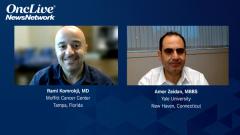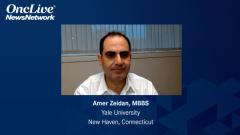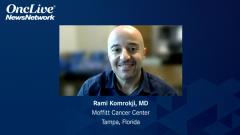
Remaining Unmet Needs and Additional Ongoing Trials in MF
Dr Komrokji summarizes the remaining unmet needs in the treatment of MF, including suboptimal responses to JAK2 inhibitors, and comments on data from ongoing trials that may address these needs.
Episodes in this series

Transcript:
Rami Komrokji, MD: The rest of the abstracts are looking at 2 areas. One is up front, to try to improve the response rates with JAK2 inhibitors or the durability of the response, and the other is in the area of suboptimal response. A third area is what to do when we have JAK2 failure, or more than 1 JAK2 failure. For the last one, there aren’t many studies. There’s an ongoing study that’s the only study looking at overall survival with imetelstat. We discussed it a little in the MDS [myelodysplastic syndrome] session. This telomerase inhibitor had been tested in MDS and in myelofibrosis.
In the myelofibrosis phase 2 data, it showed modest clinical activity, in terms of scaled reduction and symptom control, but what was observed was a signal of improved survival in patients after JAK2 failure. Historically, our group at [The University of Texas] MD Anderson [Cancer Center] reported around 14 months of median survival after JAK2 failure. With imetelstat, it was 29 months in patients with triple-negative disease, which is a very good correlation between the pharmacodynamics, pharmacokinetics, and the molecular responses. There’s an ongoing study of the schema presented at ASH [American Society of Hematology Annual Meeting], looking at randomizing patients between imetelstat and the best-available therapy. I encourage our community physicians to refer patients to this study after JAK2 inhibitor failure; it’s available at different places. Imetelstat is moving to an up-front phase 1 study in combination with ruxolitinib.
There are so many other contenders, so I don’t think we’ll have time to cover all of them. There were studies looking at ruxolitinib combination with pegylated interferon from the French group led by Dr [Jean-Jacques] Kiladjian. That shows higher response rates and durable responses. There’s a BET inhibitor, pelabresib, that had a platform study called MANIFEST. It had up-front suboptimal response at the time of failure and moved into a phase 3 randomization between ruxolitinib vs ruxolitinib- pelabresib. Dr [John] Mascarenhas presented updates from that arm of therapy in phase 2, showing promising increased response rates in addition to ruxolitinib and durable responses.
Similarly, there’s a drug called navitoclax that’s a second-generation venetoclax, but it targets BCL-XL, in a prior phase 2 study that we published and showed a promising activity. There’s an ongoing study of randomization of ruxolitinib vs ruxolitinib-navitoclax. Dr [Francesco] Passamonti from the Italian group presented an update on the phase 2 part of the up-front therapy. Ruxolitinib and navitoclax demonstrate higher responses. Historically, we get around 35% spleen volume reduction with ruxolitinib. Most of those studies are bringing that response rate to 70% to 80%.
Another drug presented was a PIK delta kinase inhibitor by Dr [Abdulraheem] Yacoub. That’s going to be moving into phase 3 up front in patients with suboptimal response. There’s a PIM1 kinase inhibitor from the group from the Memorial Sloan Kettering [Cancer Center] phase 1 study. There was 1 study on selinexor, which is an export inhibitor. It’s a selective inhibitor of nuclear export targeting XPO1 done in combination with ruxolitinib, and it showed higher activity. There were studies on an HDM inhibitor also showing activity in addition to ruxolitinib.
Transcript edited for clarity.







































